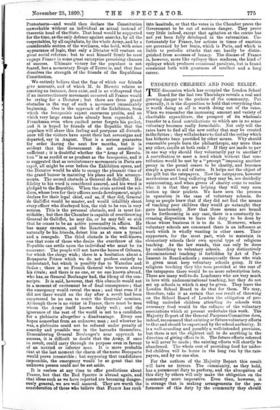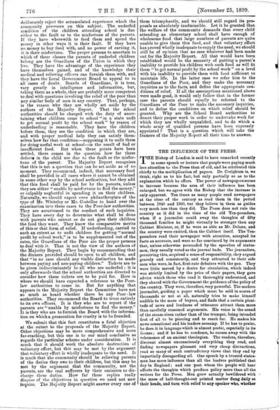UNDERFED CHILDREN AND POOR RELIEF.
THE discussion which has occupied the London School Board for the last two Thursdays reveals a real and growing danger to the pockets of the community. Put generally, it is the disposition to hold that everything that is worth doing at all is worth doing out of the rates. When we remember the increasing amount and variety of charitable expenditure, the prospect of its wholesale transfer to a fund contributions to which are in no sense voluntary becomes really formidable. Not only will the rates have to find all the new outlay that may be created in the future ; they will also have to find all the outlay which has hitherto been provided by other means. Why should reasonable people burn the philanthropic, any more than any other, candle at both ends ? If they are made to pay in one way why should they voluntarily pay in another ? A contribution to meet a need which without that con- tribution would be met by a "precept " imposing another penny in the pound ceases to be charity, and becomes simply a grant in aid of rates. It helps not the object of the gift but the ratepayers. Now the ratepayers, however meritorious and long suffering they may be, are decidedly uninteresting, and when givers of charity come to realise who it is that they are helping they will very soon button up their pockets. We have seen the process in operation in the ease of voluntary schools. So long as people knew that if they did not find the means of teaching poor children they would go untaught they gave handsomely. Now that these means are bound to be forthcoming in any case, there is a constantly in- creasing disposition to leave the duty to be done by those whose business it is to do it. Moreover, where voluntary schools are concerned there is an influence at work which is wholly wanting in other cases. Their supporters, for the most part, wish to maintain in elementary schools their own special type of religious teaching. As the law stands, this can only be done by subscribing to voluntary schools. Any distinctively denominational teaching is forbidden by Act of Par- liament in Board-schools ; consequently those who wish it given must keep voluntary schools going. If the religious teaching they like were provided at the cost of the ratepayers there would be no more subscription lists. There are many well-to-do Londoners who are very much in love with undenominational teaching, but they do not set up schools in which it may be given. They leave the London School Board to do that for them. We may, therefore, take it as certain that one result of throwing on the School Board of London the obligation of pro- viding underfed children attending its schools with necessary food would be the collapse of the voluntary associations which at present undertake this work. The Majority Report of the General Purposes Committee does, indeed, recommend that existing or future voluntary efforts to that end should be supervised by the school authority. It is a well-sounding and possibly a well-intended provision, but there is not the slightest call to do anything in the direction of giving effect to it. The future efforts referred to will never be made ; the existing efforts will shortly be abandoned. The whole cost of providing food for under- fed children will be borne in the long run by the rate- payers, and by no one else.
For the authors of the Majority Report this result will have no terrors. The community, as they hold. has a paramount duty to perform, and the abnegation of this duty by others will only make the obligation on the community more imperative. Even then, however, it is strange that in making arrangements for the per- formance of this duty by the community they should deliberately reject the accumulated experience which the community possesses on this subject. The underfed condition of the children attending school is due either to the fault or to the misfortune of the parents. If they have wherewith to feed them and spend the money in other ways it is their fault. If they have no money to buy food with, and no power of earning it, it is their misfortune. The proper persons to ascertain to which of these classes the parents of underfed children belong are the Guardians of the Union in which they live. They have the advantage of the experience they have themselves gained, and of the knowledge their medical and relieving officers can furnish them with, and they have the Local Government Board to appeal to in all cases of doubt. Boards of Guardians, it is true, vary greatly in intelligence and information, but, taking them as a whole, they are probably more competent to deal with questions involving the relief of the poor than any similar body of men in any country. That, perhaps, is the reason why they are wholly set aside by the authors of the Majority Report. That the school authorities should be charged with the duty of ascer- taining what children come to school "in a state unfit to get normal profit by the school work" by reason of underfeeding is reasonable. They have the children before them, they see the condition in which they are, and with proper medical help they can satisfy them- selves 'how far that condition—supposing it to unfit them for doing useful work at • school—is the result of bad or insufficient food. But when these points have been settled, there comes in the question how far these defects in the child are due to the fault or the misfor- tune of the parent. The Majority Report recognises that this is not a question that can be set aside as of no moment. They recommend, indeed, that necessary food shall be provided in all eases where it cannot be obtained in some other way by the school authorities, but they add that this food shall be paid for by the parents, unless they are either "unable by misfortune to find the money," or culpably neglectful in spending it on 'their children. Naturally, we should expect even philanthropists of the type of Mr. Whiteley or Mr. Costelloe to hand over the examination into these cases to the Poor-law authorities. They are accustomed to the conduct of such inquiries. They have every day to determine what shall be done with parents who cannot or do not give their children the food they want. They know the comparative merits of this or that form of relief. If underfeeding, carried to such an extent as to unfit children for getting "normal profit by school work," is to be supplemented out of the rates, the Guardians of the Poor are the proper persons to deal with it. That is not the view of the authors of the Majority Report. They begin by recommending that the dinners provided should be open to all children, and that "in no case should any visible distinction be made between paying and non-paying children." Tickets are to be given indiscriminately to all who are underfed ; it is only afterwards that the school authorities are directed to consider how these tickets are to be paid for. Here is where we should have expected a reference to the Poor- law authorities to come in. But for anything that appears in the Majority Report the Committee have not so much as heard whether there be any Poor -law authorities. They recommend the Board to trust entirely to its own officers. It is they who are to report if the parents are "unable by misfortune to find the money." It is they who are to furnish the Board with the informa- tion on which a prosecution for cruelty is to be founded.
We submit that this fact constitutes a fatal objection at the outset to the proposals of the Majority Report. Other objections may be more comprehensive and more far-reaching, but this one is to our mind conclusive as regards the particular scheme under consideration. It is much that it should work the absolute destruction of voluntary effort, but this may be met by the argument that voluntary effort is wholly inadequate to the need. It is much that the community should be relieving parents of the duties they owe to their children, but this may be met by the argument that the community, not the parents, are the real sufferers by their omission to dis- charge these duties. How far these replies really dispose of the objections in question we need not now inquire. The Majority Report might answer every one of them triumphantly, and we 'should still regard its pro- posals as absolutely inadmissible. Let it be granted that the welfare of the community demands that every child' attending an elementary school shall have enough of wholesome food that large numbers of parents are quite unable to give them this food, and that voluntary effort has proved wholly inadequate to supply the need, we should still be of opinion that no case whatever had been made out for the Majority Report. All that would have been established would be the necessity of putting a parent's inability to provide his children with such food as will fit them "to get normal profit by the school work" on a level with his inability to provide them with food sufficient to maintain life. In the latter case we refer him to the Guardians of the Poor, and they make the necessary inquiries as to the facts, and define the 'appropriate con- ditions of relief. If all the assumptions mentioned above were made good, it would only follow that in the former case the parents should equally be referred to the Guardians of the Poor to make the necessary inquiries, and to define the conditions on which relief should be granted. Why are the School Board authorities to desert their proper work in order to undertake work for which they are wholly unqualified, and to do which a whole army of qualified persons have been expressly appointed ? That is a question which will take the framers of the Majority Report all their time to answer.











































 Previous page
Previous page